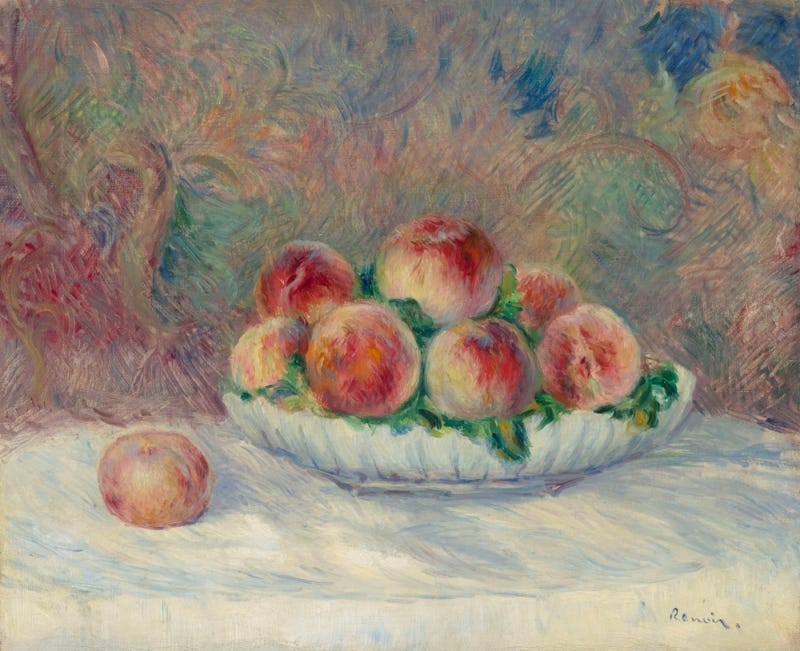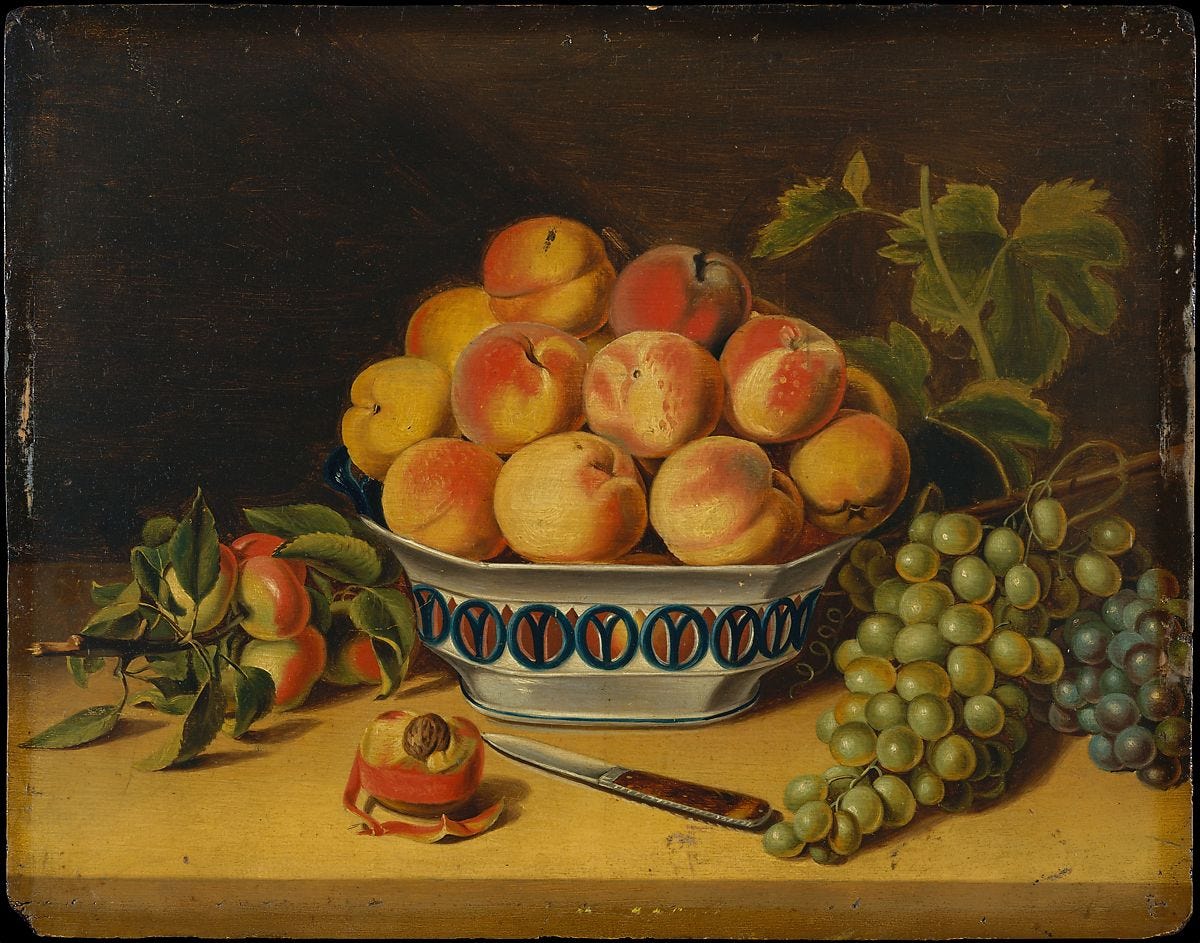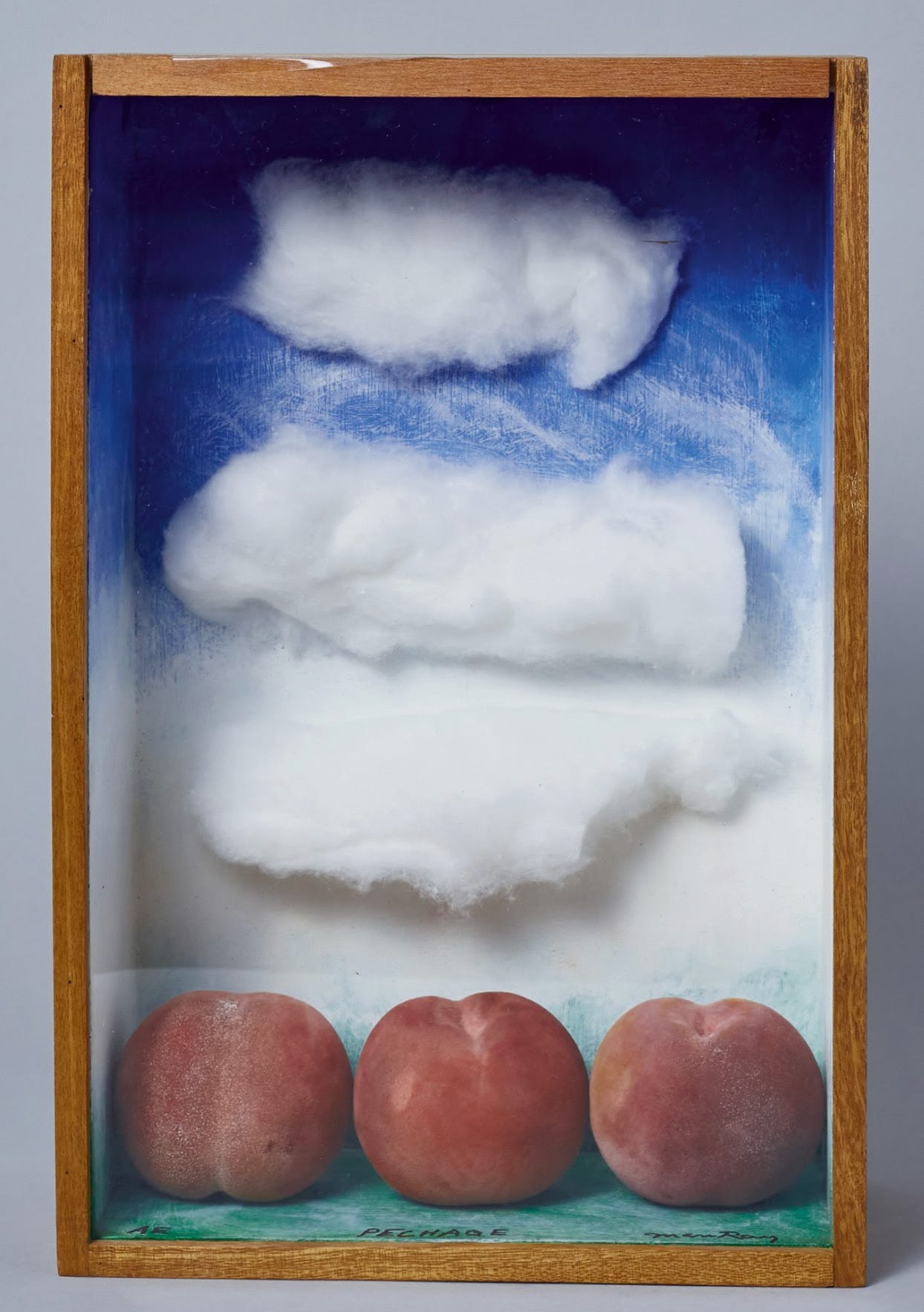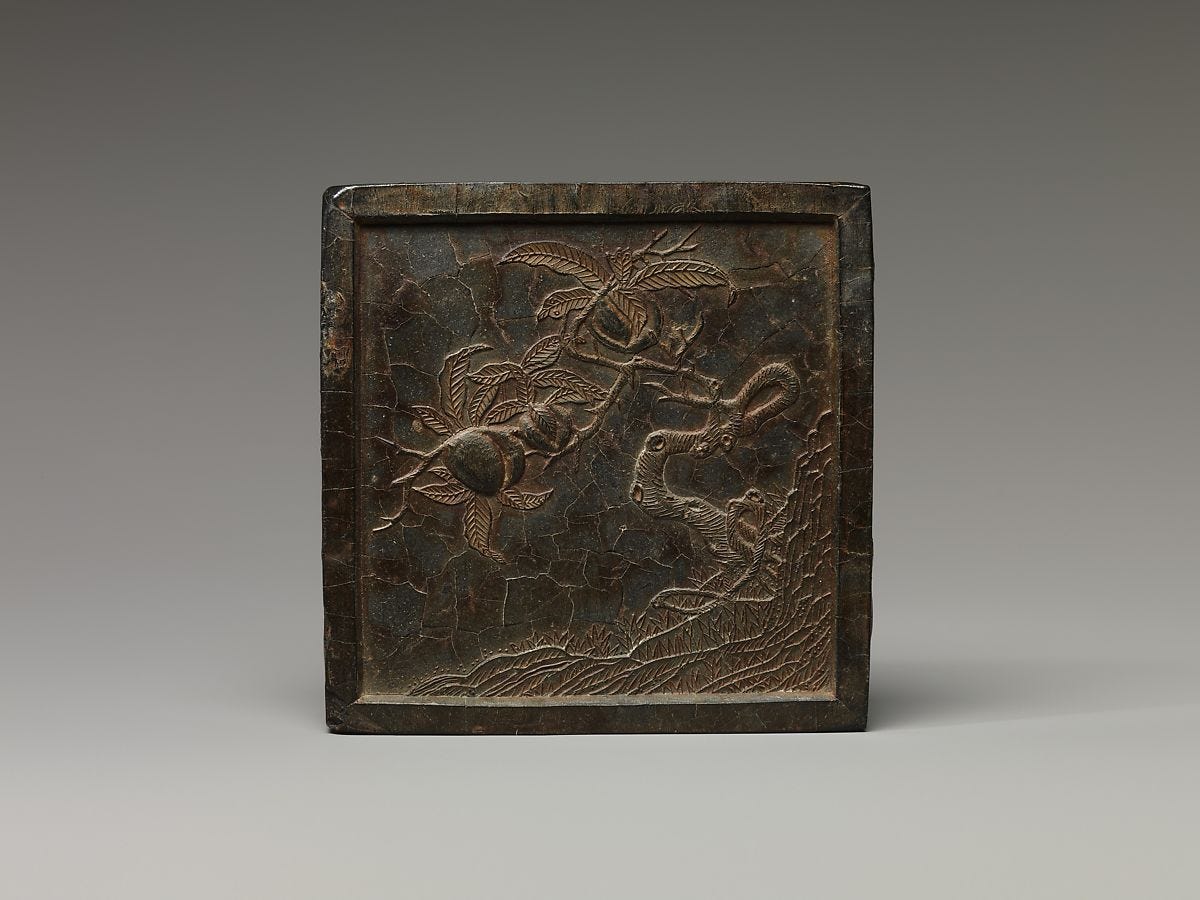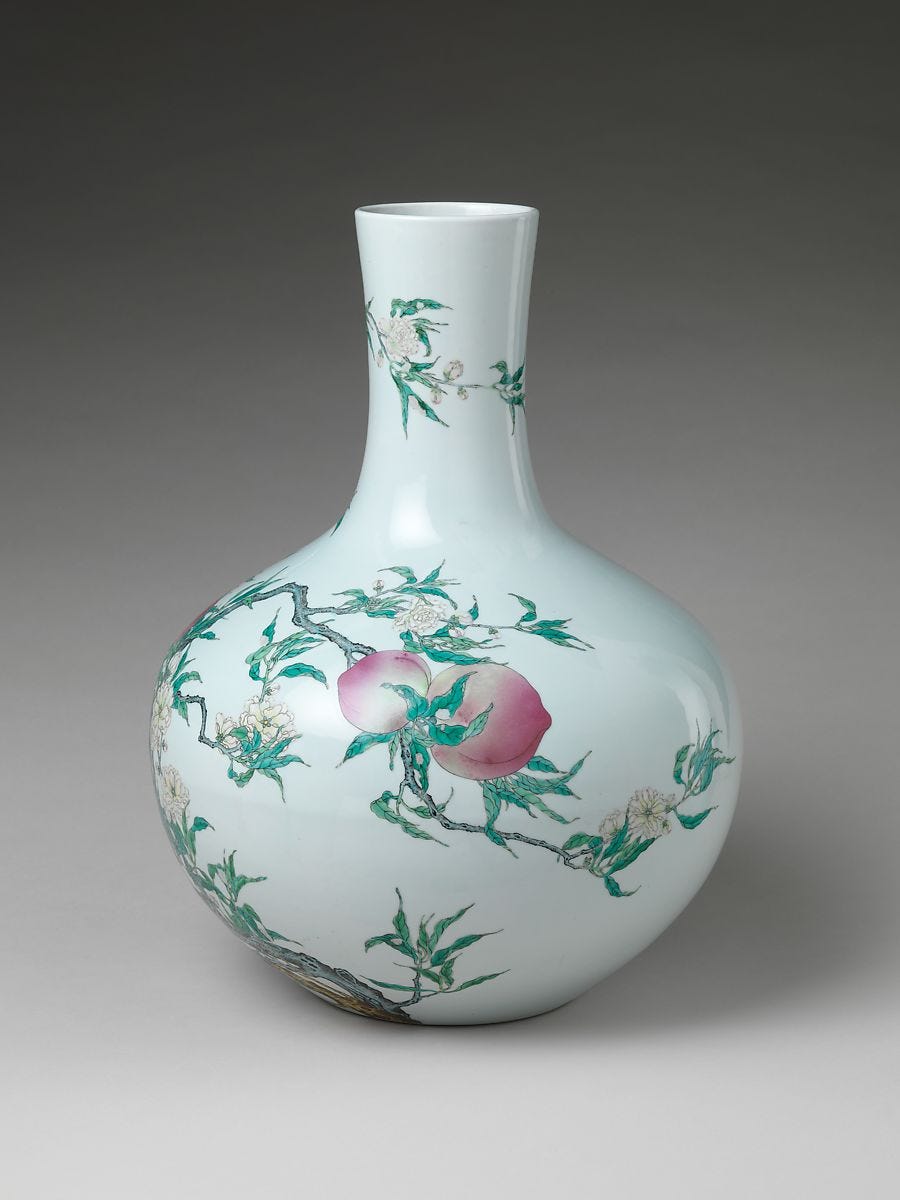#60. PEACH / PRÉSSEC
They are full of juice and the skin is soft / Prenys de suc, i la pell és suau
A DISH OF PEACHES IN RUSSIA
With my whole body I taste these peaches,
I touch them and smell them. Who speaks?
I absorb them as the Angevine
Absorbs Anjou. I see them as a lover sees,
As a young lover sees the first buds of spring
And as the black Spaniard plays his guitar.
Who speaks? But it must be that I,
That animal, that Russian, that exile, for whom
The bells of the chapel pullulate sounds at
Heart. The peaches are large and round,
Ah! and red; and they have peach fuzz, ah!
They are full of juice and the skin is soft.
They are full of the colors of my village
And of fair weather, summer, dew, peace.
The room is quiet where they are.
The windows are open. The sunlight fills
The curtains. Even the drifting of the curtains,
Slight as it is, disturbs me. I did not know
That such ferocities could tear
One self from another, as these peaches do.
Wallace Stevens
PEACH
The peach is the fruit of immortality, it has been grown in China for over four thousand years. In western cultures are often the image of purity and virginity. Izanagi, the divinity of the origins of Japanese mythology, protects himself from the thunder with a peach. Chinese ancestral tradition associates peaches with longevity and gives it a protective role against malignant influences: to celebrate the new year wooden figurines of peach trees are placed over the doors to drive out demonic forces. Peaches increase emotional and physical well-being according to Chinese medicine and it is common to have peach flowers to decorate people’s homes. Xiwangmu's legend tells how the Queen Mother of the West recited poetry, near her jade palace in the Kunlun mountains, in a garden filled with peaches blossoming every 3000 years and its fruits needed another 3,000 years to ripen: they were the peaches of immortality.
“Today, values are also the subject of individual consumption. They become merchandise. Values such as justice, humanity or sustainability are economically scrapped to take advantage of them: «Save the world by drinking tea», says the slogan of a fair trade company. To change the world consuming : that would be the end of the revolution. At this step there will soon be vegan smartphones. Neo-liberalism exploits morality in many ways. Moral values are consumed as signs of distinction. They are transferred to ego’s bank account, which increases self-assessment.”
The Disappearance of Rituals by Byung-Chul Han
UN PLAT DE PRÉSSECS A RÚSSIA
Tasto aquests préssecs amb tot el cos,
els toco i els oloro. Qui parla?
Me n’amaro com l’angeví
s’amara de l’Anjou. Els miro amb ulls d’amant,
com un jove amant mira els primers brots de primavera,
com toca la guitarra el gitano espanyol.
Qui parla? Ha de ser aquell jo,
l’animal, el rus i l’exiliat, per a qui
les campanes de la capella pul·lulen sons
al cor. Els préssecs són grossos i rodons,
ah, i vermells, i amb borrisol de préssec!
Prenys de suc, i la pell és suau.
Prenys dels colors del meu poble
i de bon temps, d’estiu, pau i rosada.
La cambra on són està en calma.
Obertes les finestres. La llum del sol
omple les cortines, que tremolen un xic,
això m’inquieta. Jo ignorava
que aquestes ferocitats podrien separar-me
de mi mateix, com fan aquests préssecs.
Wallace Stevens
PRÉSSEC
El préssec és la fruita de la immortalitat, es cultiva a Xina des de fa més de quatre mil anys. A les cultures occidentals solen ser la imatge de la puresa i la virginitat. Izanagi, la divinitat dels orígens de la mitologia japonesa, es protegeix del tro amb un préssec. La cultura ancestral xinesa associa el préssec a la longevitat i li atorga un paper protector contra les influències malignes: per celebrar l’any nou es col·loquen a les portes figuretes de fusta amb forma de presseguer per expulsar les forces demoníaques. Els préssecs augmenten el benestar anímic i físic segons la medicina xinesa i és habitual tenir flors de presseguers per decorar les llars. La llegenda de Xiwangmu narra com la Reina Mare de l’Oest recitava poesia, prop del seu palau de jade a les muntanyes de Kunlun, en un hort ple de presseguers que florien cada 3000 anys i els seus fruits necessitaven 3000 anys més per madurar: éren els préssecs de la immortalitat.
“També els valors serveixen avui com a objecte del consum individual. Es converteixen en mercaderies. Valors com la justícia, la humanitat o la sostenibilitat són desballestats econòmicament per a aprofitar-los: «Salvar el món bevent te», diu l'eslògan d'una empresa de comerç just. Canviar el món consumint: això seria el final de la revolució. A aquest pas aviat hi haurà telèfons intel·ligents vegans. El neoliberalisme explota la moral de moltes maneres. Els valors morals es consumeixen com a signes de distinció. Són apuntats al compte corrent de l'ego, la qual cosa fa que augmenti l'autovaloració.”
La desaparición de los rituales de Byung-Chul Han





